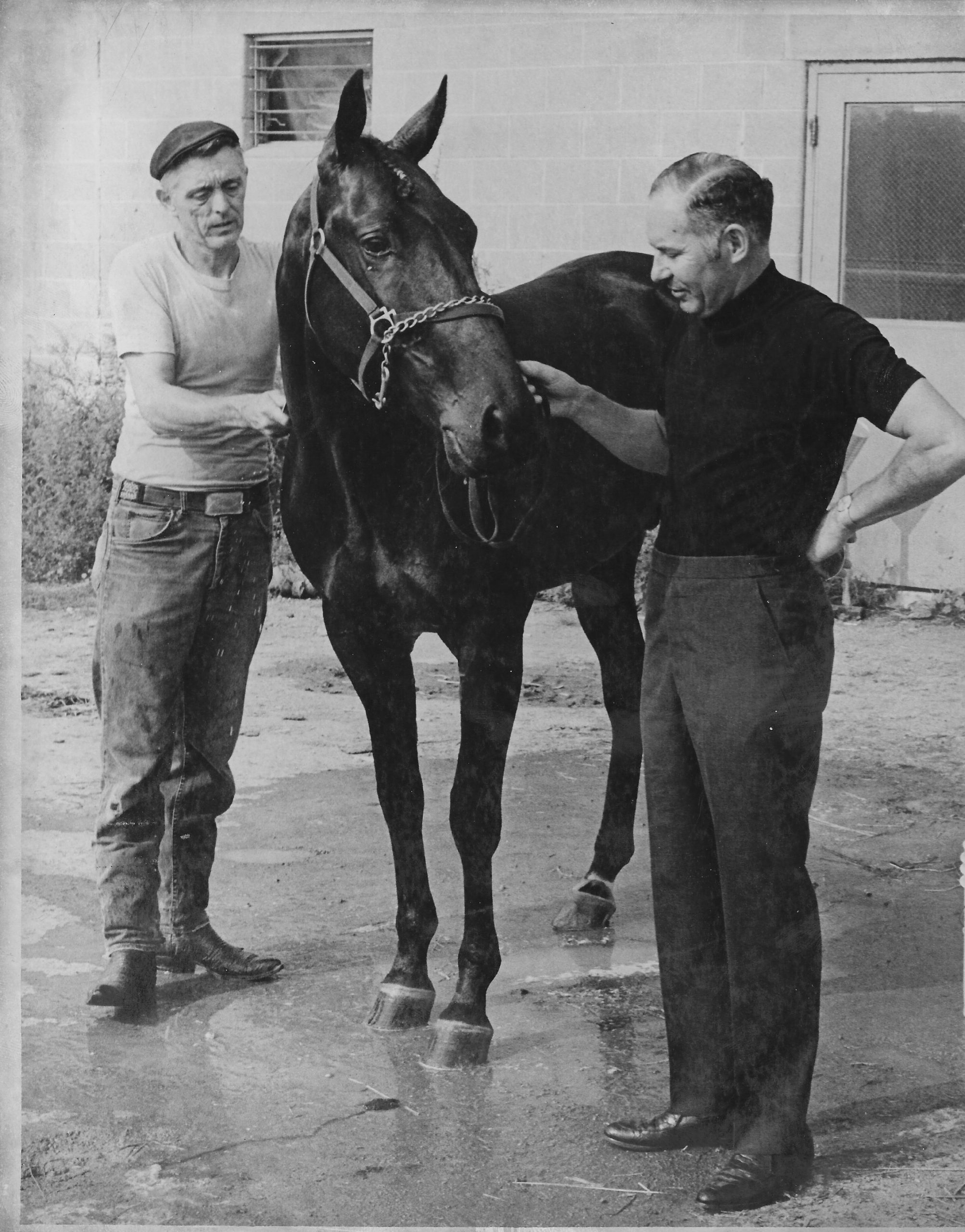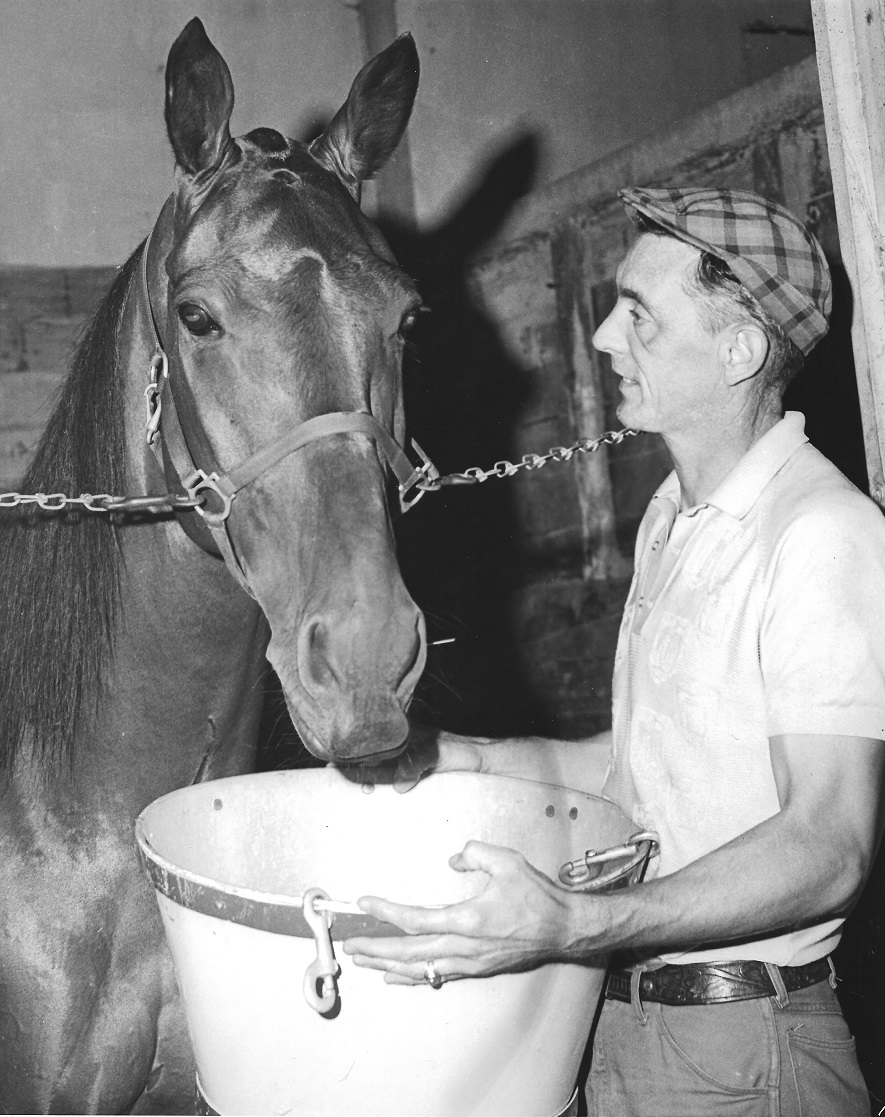The harness racing colt by Meadow Skipper out of Voo Doo Hanover had been brought to the races by Harry Harvey and was 1970’s Two-Year-Old Colt Pacer of the Year with a record of 21 wins out of 24 starts.
His owner, used car dealer Bert James, had him syndicated (and didn’t include Harvey) for $1.25 million and the syndicate then decided to turn him over to Stanley Dancer to train for his three-year-old season.

Stanley was just coming off four headline horses: Cardigan Bay in `68, trotting’s horse of the Year 1967, 1968, 1969 and Triple Crown winner Nevele Pride, followed by 1970’s pacing Triple Crown and Little Brown Jug Winner Most Happy Fella.
When word circulated through the grapevine that Stanley was getting Albatross, most of the old timers (regular fulltime help) in the stable were positioning to get the colt, but not Joe Wideman. Joe had been in Florida with the stable and was blindsided himself when Stanley asked him to take Albatross.
He was not expecting, nor did he particularly want to campaign another champion. It takes a lot of time and dedication to travel with the champs as your whole life on the road is devoted to them, including spending many a night sleeping in a cool shed row, moving week to week, and setting up the stable according to ridged specifications.

There were top-notch caretakers such as Hans Nielsson (Nevele Pride) Phil Simzer (Most Happy Fella) Burt Harper, Richard Cluff, and a dozen others available, but Stanley wanted to go with the best.
After several days of skillful coercion – and believe me Stanley Dancer was not one to beg – Joe finally relented. They even added Roger “Shadow Roll” Prichard, the caretaker of Su Mac Lad, along for backup. Either one of them alone were tops on keeping a horse in their best condition – both physically and mentally – and together they were a chalk ice-cold daily double.
They called him “Albert” and Albert knew the routine and he did the routine well. The change in scenery, location, or grooms did not bother him and he continued his winning ways, taking accolades in both of his final years of racing.
After his four-year-old season Albatross was retired to stud with his career stats of 71 lifetime starts, 59 wins, 8 seconds, 3 thirds with $1,201,477 made in those three years and had a story that was worthy of a book: Super Bird. The Story of Albatross by USTA’s Donald P. Evans.
The book was written in 1975 and I arrived on the scene in Florida late in the year. After a winter of learning how to do it right the whole contingent shipped back with numerous hopefuls to Egyptian Acres in New Egypt NJ.
Joe had spent that winter in at the Farm working for Stanley’s son, Ronnie Dancer. He wasn’t ducking the notoriety or the spotlight which Ron would say “goes with the territory” as his colt, Eroica, was bred and owned by Hall of Famer Ernest Morris, the President of Saratoga Raceway and his wife. Their partners on the soon-to-be Jersey Champ were Sydney Rabb and his daughter Helene Cahners, the CEOs and owners of the Stop and Shop Companies, employers of over 60,000 people. A nice “Mom and Pop” operation, eh?
Joe kept to himself in the third barn with his charges, often walking through the turmoil and hubbub of the second barn to stop and chat with the older help as he checked the training schedule posted on the board. The rookies knew who he was and he’d give a quick nod of the head as he went by… sometimes.
As the summer progressed and the horses started to win and didn’t fall by the wayside, he got to know the names such as “Andy” Peluso on Kawartha Eagle, p2 1:55.3m (probably the best of a super crop of two-year-olds that year) “Keith” Miller and Yankee Bandit, 3 1:58m $445,953; “Barb” Kessel and Zoot Suit, 3 1:58.1m $375,728. He saw their work and the product on the racetrack.
One afternoon he finally stopped by my stalls and just asked “that filly win again?”
“Ah, yes,” I answered quite taken by surprise.
“Well… she got to be one helluva mare with you rubbing her.”
And off he walked.
The circus went on the road in different directions, Grand Circuit, Sire Stakes etcetera… everyone had their stakes mapped out for the season and some would occasionally come back to the farm for a little turn out time.

It was during these days that I was in “Joe’s barn” and I got to observe him in action and ask a few tips.
“Don’t rush around them,” he’d say. “It only gets `em nervous. And If you’re going to correct them, make sure they know what they’re being corrected for.”
I only saw Joe get stern with one once as he was putting the harness on. Boom, bam, zing and that was it. He didn’t hurt the horse (some old foreign bred) but he got his attention and his eyes rolled. Lesson learned. Then Joe went calmly back to work.
“Let them be a horse,” he advised me. “Let them enjoy themselves. They gotta be kept fresh.”
I think this is probably the best bit of wisdom he gave me.
While several of the “good grooms” (the ones that were always neatly dressed) had their share of champions they expected them to act the part, often correcting them for the slightest infraction. It’s similar to a teacher or a coach or a boss who constantly snaps at you for something trivial. You do your job but do you enjoy it? It translates to the racetrack and they will sulk if they ain’t happy.
I’d ask him about Albatross and his manners. Joe said that he “was the smartest horse” he’d ever been around.
“Geez,” he’d shake his head, “was he smart.” It had been over six years since Albatross had retired to stud but Joe would still stop in midsentence and think aloud in awe of the animal.
“Whenever it was race day,” Joe would tell me, “as soon as I had walked him, bandaged him up, and put him in his stall he would immediately lay down and rest. He knew he was going to do battle that night. It didn’t matter where or what track we were at, he just knew.”
“Did you ever read the book that Evans wrote about Albatross?” he asked one day. “It’s a great story. Interesting.”
When I replied that I hadn’t, the next morning he handed me the 246-page hard cover publication.
“Don’t lose that,” he instructed me. “Stanley gave that and signed it for me. And it’s my only copy.”
After a few days went by he asked if I’d read the book.
“What book?” I asked blankly.
“I’ll ‘what book’ you,” he laughed.
After I had read it I gave it back to Joe and grinned “Okay, what do you want to know about Albatross?”
He just shook his head and looked to the heavens.
I did ask about Albert’s infamous loss in the 1971 Little Brown Jug and while it stayed with Stanley until the end of days, Joe took it in stride. As he did when Albert was off the board that one time in his 71 lifetime starts. It was a combination of factors that just happen. And as Joe would say: “these aren’t machines, you never know what they’re going to do.”
I know I’m starting to ramble.
We’ll have more on who Maggie (everyone’s Swedish darlin’) called “Joe der Widerman” later.
by Thom Pye, for Harnesslink

 USA
USA Canada
Canada Australia
Australia New Zealand
New Zealand Europe
Europe UK / IRE
UK / IRE


